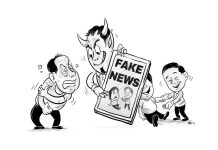
THE ABRUPT removal of Police General Nicolas Torre III as Chief of the Philippine National Police (PNP) after a mere 85-day tenure has sent ripples of uncertainty through the country’s security apparatus.
Beyond the headline, the incident highlights a critical, and often contested, constitutional power of the President to appoint and remove officials, and how that authority intersects with the role of oversight bodies like the National Police Commission (Napolcom). It serves as a potent reminder of the delicate balance of power enshrined in the 1987 Philippine Constitution, and the potential for institutional conflict when that balance is tested.
General Torre’s downfall was triggered by his defiance of Napolcom’s directive regarding the reassignment of senior officials, including his own second-in-command, Lieutenant General Jose Melencio Nartalez Jr. In a power play that defied established protocol, Torre went ahead with his reshuffle without Napolcom’s necessary clearance. This move prompted a resolution from the commission to recall and reverse his order. The ensuing standoff culminated in President Ferdinand Marcos Jr. intervening and ultimately siding with Napolcom, ordering Torre’s relief.
This is where the constitutional question comes to the fore. Article XVI, Section 6 of the 1987 Philippine Constitution states that the police “shall be administered and controlled by a national police commission.” However, the President, as the nation’s chief executive and Commander-in-Chief, has the prerogative to appoint officials like the PNP Chief. While the President’s authority to appoint is clear, the power to remove is subject to legal and institutional procedure.
The President’s decision to side with Napolcom and remove Torre, despite reports of a previous good working relationship, sends a powerful message that this administration prioritizes adherence to institutional processes over personal allegiance.
The President’s power to remove officials is rooted in the principle that those who hold office under his appointment serve at his pleasure. This is particularly true for positions that require the President’s trust and confidence, such as the head of the country’s national police force. In this case, Torre’s actions were seen as a challenge to the established chain of command and the institutional integrity of the PNP. While his actions were not sanctioned with criminal or administrative charges, the conflict with Napolcom was a clear red line for the administration.
The short-lived tenure of General Torre serves as a stark reminder that even a high-performing and well-liked official is not exempt from institutional accountability. It highlights the importance of institutional checks and balances, as well as the President’s decisive role in upholding the rule of law within the executive branch. Moving forward, the incident sets a new precedent for future PNP chiefs, emphasizing the need to work in strict accordance with the law and in coordination with oversight bodies like Napolcom, or risk a similar, untimely fate.
The episode also leaves PNP with a leadership void that must be carefully managed to ensure a seamless and efficient transition. The final chapter for this episode will be written in the coming days, with the fate of Torre’s four-star rank hanging in balance, and the new PNP chief tasked with rebuilding public trust and organizational unity./PN







